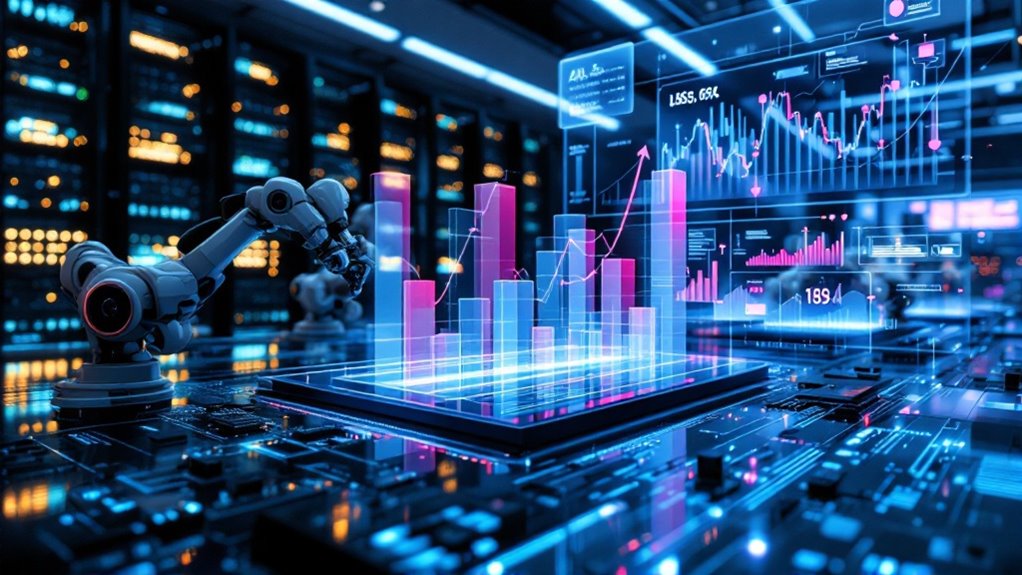AI is exploding, with the market hitting $309.6 billion by 2026. Not just a fad, folks. By 2025, chatbots will handle 85% of customer service interactions—humans beware. Healthcare, autonomous vehicles, and banking are all jumping on the AI bandwagon. But it's not all smooth sailing. Data quality matters (garbage in, garbage out), and ethical concerns are growing. Companies are scrambling to address bias and privacy issues. The AI revolution has only just begun.

While tech buzzwords come and go, AI isn't just another flash in the pan. The global AI market is exploding, with experts projecting a mind-boggling 40.1% compound annual growth rate from 2021 to 2026. That's $309.6 billion, folks. Not chump change. This massive expansion isn't happening in a vacuum—it's being fueled by leaps in Machine Learning and computing power that would've seemed like science fiction a decade ago.
By 2025, AI chatbots will handle 85% of customer interactions. Think about that. Robots managing most of your customer service. Weird, right? But it's happening. These systems are getting smarter, analyzing customer behavior to create marketing campaigns tailored just for you. Kind of creepy. Kind of brilliant.
AI isn't just coming for customer service—it's already here, watching, learning, and getting eerily good at understanding you.
Industries are falling over themselves to adopt AI. Healthcare is using it for patient care and spotting diseases in medical images. Autonomous vehicles are getting safer through real-time data processing. Banks are boosting security and offering personalized services. Even drug companies are speeding up development with AI tools. It's everywhere. The development of natural language processing capabilities has dramatically transformed how we interact with these AI systems across all these industries.
Data quality remains a huge hurdle, though. Garbage in, garbage out. That's always been true. Machine learning algorithms are finding patterns humans miss, but they need good data to work with. Companies like Photobucket have seen response times improve by 14% with AI-powered tools like Zendesk bots. Natural Language Processing is chewing through customer feedback and social media posts at lightning speed, turning complaints into actionable insights. Market research decision-makers overwhelmingly agree that AI benefits the industry, with 80% believing it will have a positive impact.
The ethics conversation is heating up too. More countries are passing AI laws. Companies are forming ethics committees. Everyone's worried about bias and privacy. As they should be. These systems are only as fair as the data they're trained on, and that data comes with all our human flaws baked in.
Industry-specific AI solutions are where the real money is. Generic AI is out. Specialized, vertical-focused tools are in. Companies that can deliver tailored solutions for specific industries will dominate the market. That's not speculation. That's just how it's going to be.
Frequently Asked Questions
How Will AI Impact Job Security in Traditional Industries?
AI will hit traditional industries hard. Period.
Jobs with routine tasks are goners—manufacturing workers, cashiers, truck drivers. About 25% of jobs in OECD countries face high automation risk.
Not all doom though. New roles will emerge in AI management and tech support. Workers will need to adapt fast.
Some industries might see AI as a helper, not a replacement. But change is coming. Ready or not.
What Ethical Concerns Arise From Widespread AI Adoption?
Widespread AI adoption creates major ethical headaches.
Bias in algorithms? Totally real. AI systems mirror society's prejudices, leading to unfair outcomes.
Privacy concerns? Massive. These systems gobble up personal data like candy.
Then there's the whole surveillance thing. Scary stuff.
Human rights and accountability remain murky.
Who's responsible when AI messes up? Nobody knows.
Regulation is playing catch-up. Companies talk big about ethics but implementation? That's another story entirely.
How Accessible Will AI Technology Be for Small Businesses?
AI tech is already crazy accessible for small businesses. Nearly 98% use AI tools now.
Cloud computing made it cheap. Pay-as-you-go models? Perfect for tight budgets. Small shops started jumping on the AI train last year in droves.
The playing field's getting more level. Big corporations don't have all the advantages anymore.
Technical know-how remains a hurdle, though. Some owners still struggle with the learning curve.
What Regulations Might Limit AI Development in Coming Years?
Several regulations threaten to put the brakes on AI development.
Export controls on chips and model weights are already limiting global collaboration. The EU AI Act imposes strict rules on high-risk systems. China demands content labeling. Privacy laws are tightening everywhere.
Data minimization requirements could starve hungry models. Algorithmic bias regulations may slow deployment.
Honestly, regulators are scrambling to catch up. The balance between innovation and control? Still being figured out.
How Is AI Education Evolving to Meet Industry Demands?
AI education is shifting fast. Schools are teaching AI literacy as a basic skill, not just a fancy add-on.
Personalized learning? Yeah, that's happening through AI tools that adapt to student needs. The market's exploding—projected to hit $73 billion by 2033. Weird, right?
Ethical guidelines are finally getting attention too. Virtual labs and AI simulations are replacing dusty textbooks.
Industry wants grads who understand AI principles and can navigate the messy ethical stuff.
References
- https://www.contentgrip.com/future-ai-marketing/
- https://www.voxpopme.com/learn/blog/ai-market-research-industry-future/
- https://blog.google/products/google-cloud/ai-trends-business-2025/
- https://elearningindustry.com/artificial-intelligence-market-important-trends-and-obstacles-to-consider
- https://www.pwc.com/us/en/tech-effect/ai-analytics/ai-predictions.html
- https://linvelo.com/the-job-displacement-dilemma/
- https://ijgis.pubpub.org/pub/gdfpmgv9
- https://www.ml-jobs.ai/news/ai-adoption-transforming-industries-and-job-markets
- https://www.stlouisfed.org/publications/page-one-economics/2024/dec/ai-and-the-future-of-work-opportunity-or-threat
- https://www.datarails.com/industries-impacted-by-ai/









